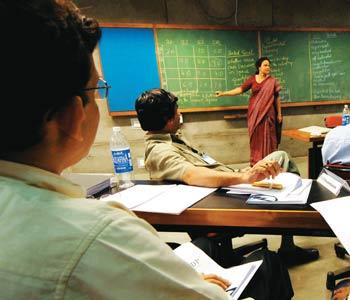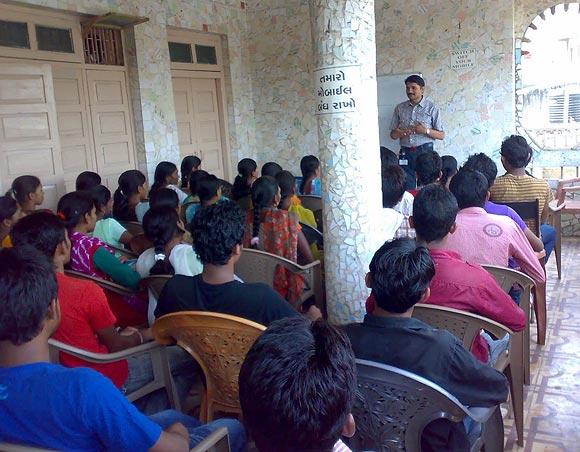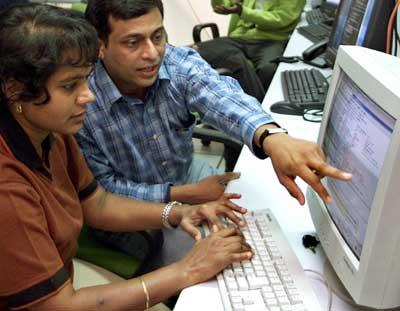Photographs: Careers360 Urmila Rao, Careers360
Engineering requires creative imagination to discover useful applications, critical thinking for flawless implementation, capped with finesse. But do our BTechs fit the bill?
Deepak Bhardwaj was trained to be an electronics and communication engineer but is employed as a record-keeper in a firm delivering and feeding cash in ATMs (automated teller machines).
He says his campus received only a handful of small companies that selected a couple of students from his batch of 120 students. One company even asked for money from students in lieu of jobs, he says.
Bhardwaj's story will move you, but when you come across similar stories dotting the country's engineering landscape, you start worrying -- mostly on the festering structural flaws that result in low-skilled engineers.
NASSCOM, an industry body, states in its report 'Perspective 2020' that only 26 per cent of engineers are employable in technology services. The scenario is pretty much dismal in other streams of engineering as well.
"In a country that produces an estimated 5 lakh engineers annually, employability is only in the band of 1 to 40 per cent depending upon the sector," states Nikhil Indrasenan, Business Head, Training, Ma Foi Randstand.
So, one wonders what leads to the yawning gap? Are students unable to cope up with the technical studies or is it the increasing number of middling colleges (read shops) selling false hopes, the culprit?
Either way, it seems, a lax approach is hurting a graduate's employment chances.
Do you agree with NASSCOM's report that only 26 per cent of engineers are employable for technology services? Share your views on Rediff ZaraBol below!
'Poor teaching standards and inadequate infrastructure ails the system'
Image: Image for representation purpose onlyPhotographs: Rediff Archives
The Employability Quotient
Deepak's case is not an aberration. Most BTechs are either working in an unrelated field or still searching for a relevant profile.
A clutch of students from cream colleges grab plum offers, others are left foraging for appropriate experience. Reason? An existing imbalance due to stark segregation of institutes.
At the top tier are the premium colleges, which, through their tough selection criteria, admit and nurture the most technically-inclined minds.
The institution's brand value gives an added confidence to its enrolled students. Then, there are middle-tier colleges, some of which deliver quality and attract students. But a sizeable number of institutes fall between the bottom -- tier-two and in tier-three segments.
Caught among them are students mostly from Andhra Pradesh, Maharastra, Tamil Nadu, Uttar Pradesh and other regions.
Other glaring reasons exist too. Poor teaching standards and inadequate infrastructure ails the system. There are compromises at the entry points in a bid to fill seats. Some colleges demand capitation fee -- a reality -- with an ongoing rate of Rs 2 to 6 lakhs in Delhi NCR region. The quality of such graduates is poor.
Himashu Aggarwal, co-founder, Aspiring Minds, an assessment firm explains, "While an organisation may not expect a candidate to have in depth knowledge of computer science, it at least expects a decent piece of code to be written and the ability to debug and submit a working programme."
When technical orientation of candidates is weak, an ill-equipped faculty is a double whammy.
At multiple colleges that have mushroomed in the Delhi NCR region, an ex-BTech graduate can be found teaching fresh batch of BTechs. With the adoption of such practices, employability quotient dips.
Engineers, today, need broad based skills that are outside the realm of textbooks
Image: Image for representation purpose onlyPhotographs: Rediff Archives
Mapping industry academia
Companies question the teaching practices in high cluster colleges as well. Then, the common complaint emerges: graduates don't possess critical thinking, problem-solving, solution-offering and innovative skills.
While they rue the faculty's incompetence, organisations are also cognizant of the fact that teaching is the last option as a career choice. Shekhar Sanyal, country head of Institution of Engineering and Technology agrees and emphasises that the "government should make teaching a viable career choice."
An outdated syllabus across all tier colleges is an added woe. "Engineers, today, need broad–based skills that are outside the realm of textbooks," says Srikantan Moorthy, Senior VP, Education and Research, Infosys.
Generic or soft skills remain a sore point, especially for Tier-II and Tier-III college students.
Here's how a majority of IT companies assess an engineer in its interview process: Check the English language proficiency first, follow it up by a group discussion; technical competency is evaluated in the end. Market need propels this fashion and order of assessment.
As a result many students, especially from small regions, lose out to a smooth communicator despite possessing sound technical knowledge.
Most colleges don't factor in these significant aspects in their teachings. Students are not familiarised with updated employment trends either. There are students for instance, from Kolar in Karnataka or Amritsar in Punjab faltering while giving a Skype or telephonic interview because they've never used it.
"Client and market requirement is changing fast," says Savita Singh, National Head, Placements, IIJT Education. A lot of small city BTech students end up investing extra money and time, over and above their courses, to refine their soft skills.
Companies have to spend several man-hours training fresh recruits
Image: Image for representation purpose onlyPhotographs: Jagadeesh Nv/Reuters
What do companies want?
For the last few years, the trend of acquiring MBA qualification apart from engineering has been garnering pace.
Reason: Companies demand generic skills in a candidate, where engineering institutes have been found wanting in a massive manner. Some varsities have taken initiative but they are few and far in between.
Companies have to spend several man-hours in training fresh recruits.
Semiconductor company MediaTek India allocates 6 to 8 weeks brushing up their fresh recruits' communication (plus technical) skills.
At Infosys, a 23-week residential training programme is run. A long period since, "college curriculum doesn't include communication skills," Moorthy answers candidly.
Prashant Deo Singh, Head HR, Panasonic India, wishes engineers could be oriented towards entrepreneurship and stimulated on responsibility of social contribution. So the company imparts some orientation to its fresh employees. But a lot of companies don't see it viable to devote huge sums in training, and therefore, gravitate towards picking the best of candidates from premium colleges.
When companies vie to hire from a limited pool of the best, income levels go askew, which leads to wider social imbalances.
Perhaps, it is the skepticism over current learning in colleges, that most IT companies demand industry-backed certifications as well. So, after four years of BTech, engineers line up to obtain certificate programmes in JAVA, CISCO, Red Hat and others.
Getting ready-to-deploy candidate is a wishful thinking for companies. Chances are it will remain so unless students are exposed adequately to practical training in their 4-year study tenure.
Sanyal of IET presses on its need. "Students should be mandated for technical visits from first year onwards," he emphasises.
The country is becoming a labour surplus market sans talent
Photographs: Careers360
Who is on the altar?
In Deepak's case, his salary doesn't compensate for the cost of the course. He feels shortchanged.
"My college at Mohanagar, Ghaziabad, lured us with false claims," he says adding that none of the big ticket companies that the institute mentioned ever set foot in the campus.
There were no summer trainings. Many colleges are thriving on lies. Who tends to lose out in this bad governance?
"It is a multi-stake holder issue," Moorthy says referring to quality of professional education. Rightly so.
Sample Deepak's case: A 75 per cent holder in PCM from Kendriya Vidalaya, a pass-out of UPTU entrance exam.
Sum spent on course: Rs 3.5 lakh (minus hostel fees)
Current salary: Rs 8,000 pm
Sector employed: Finance, unorganised
Technical skills: Unutilised
Prior industry exposure: Nil
Career prospects: Bleak
Contribution to economic growth: Half his potential
Personal fall out: Downward social mobility
Corresponding fate of college: Thriving, luring more students.
No wonder, the country is becoming a labour surplus market sans talent, sums up Moorthy.
'Government should become stricter in approval process'
Photographs: Careers360
Indiscriminate approvals
AICTE's indiscriminate approvals to institutes anger many a company that feel equally shortchanged.
Ashish Bakshi, HR Head, MediaTek India says that most colleges get a nod despite inadequate infrastructure and poor faculty.
He adds, "Government should become stricter in approval process." Singh of Panasonic echoes the thought. A lot needs to be done on regulations, he says. He suggests a quality check on mushrooming colleges by a certified agency.
A little self-market correction has been witnessed. Students' interest in engineering seems to be waning. Last year, over 30,000 seats in engineering in Maharashtra went vacant. 138 institutes are on the verge of closing.
This includes engineering, MCA plus management colleges Among other reasons, it is also because some streams require high technical know-how and a lenient entry takes both the student and college only so far.
When Aspiring Minds sampled students from 250 engineering colleges it found out that employability in IT product sector is only 2.68 per cent.
"That is because a strong understanding of computer programming and algorithms is required in this sector," says Himanshu.
What's more, the company's latest report on employability of graduates comprises other startling revelations on poor employability. But it may not be prudent to leave corrections to the whims and fancies of the market.
A systematic intervention is required so that the institutions offer more value. Bad regulation always come backs to haunt.







Comment
article